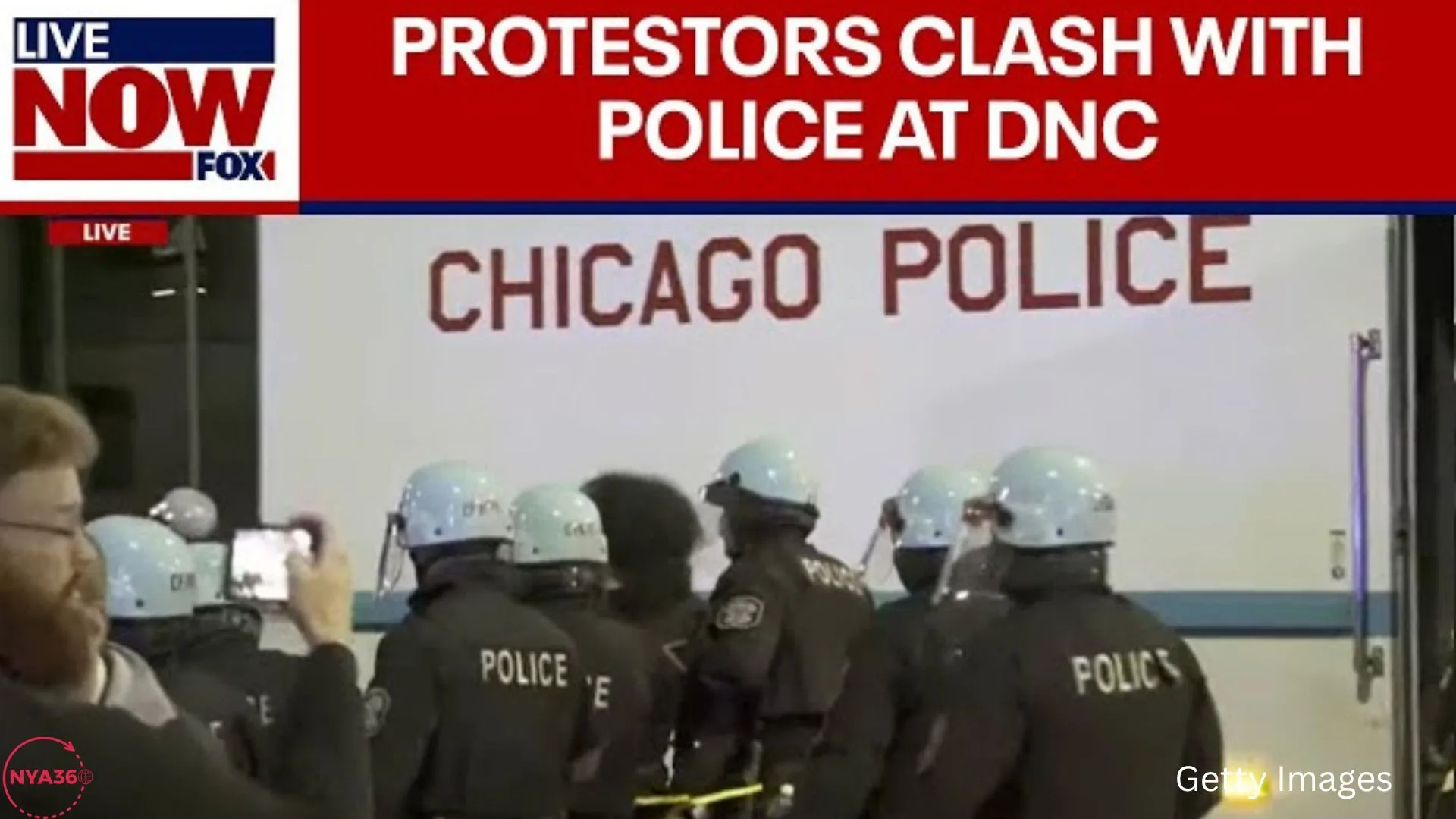Today, in Chicago, there was an increase in tensions as demonstrators supporting Palestine and different activist organizations engaged in conflicts with police officers near the United Center, where the last day of the Democratic National Convention (DNC) is being held. The demonstrators, who were protesting the ongoing endorsement of Israel by the U.S. government, made an effort to advance toward the convention location but were confronted by a substantial police force. The situation rapidly escalated, as demonstrators and law enforcement officials engaged in intense confrontations, with projectiles allegedly being hurled at the police, resulting in physical altercations and apprehensions.
The pro-Palestine marches are a component of a wider surge of activism that has spread throughout the United States in response to the renewed war between Israel and Gaza. A significant number of demonstrators in Chicago have been motivated and energized by recent occurrences in the Middle East, including the increasing number of non-combatant deaths in Gaza. They perceive the DNC as a crucial venue to express their discontent with the Biden administration’s position, which they contend is indirectly supporting the bloodshed by persistently supplying military assistance and diplomatic support to Israel.
The protests were strategically planned to coincide with a prominent event and were specifically aimed at highlighting the perceived lack of action by the Democratic Party in advocating for the rights of Palestinians. Despite internal disagreements within the party, with several progressive members advocating for stricter actions against Israel, the official position continues to express support for Israel’s right to self-defense. Activists are expressing indignation over this stance, contending that it fails to acknowledge the disproportionate effect on Palestinian people.
While heading towards the United Center, the demonstrators confronted a substantial presence of law enforcement. The Chicago police, in collaboration with federal security forces, established barricades and endeavored to confine the marchers. Nevertheless, the crowd’s resolute resolve to approach the conference site resulted in clashes, as certain protestors breached barriers and endeavored to advance closer to the venue.

The confrontations escalated in intensity when demonstrators launched projectiles, such as bottles and garbage, against law enforcement officials. Law enforcement responded by employing crowd control measures, which involved the utilization of batons and, as per certain eyewitness testimonies, pepper spray. Amidst turbulent scenes, the situation rapidly escalated, resulting in the detention of several demonstrators. The escalation of the conflict underscores the growing exasperation of activist organizations who perceive their opinions as disregarded by the ruling class.
Aside from the pro-Palestine factions, the demonstrations also attracted a varied alliance of activists, encompassing anti-war associations, proponents of social justice, and environmental organizations. The convergence of these groups highlights the wider discontent with the present political atmosphere, especially among individuals who perceive themselves as being excluded by the policies of mainstream parties. The event served as both a critique of the Democratic Party’s overall foreign policy and a plea for unity with Palestine.
The protest organizers stated that their actions were intended to be nonviolent and aimed at highlighting what they perceived as the party’s inconsistency on matters of human rights and social justice. “We are present here because the Democratic leadership has consistently demonstrated their preference for geopolitical interests over the well-being of marginalized individuals,” one organizer declared. “It is imperative that we do not remain silent while our government persists in providing financial resources and assistance that effectively contribute to the subjugation of the Palestinian people.”
The conflicts within the DNC occur during a delicate period for the Democratic Party, as it grapples with an increasing division between its progressive faction and the more moderate establishment. The matter of U.S. backing for Israel has grown more controversial within the party, as notable leaders such as Senators Bernie Sanders and Elizabeth Warren advocate for a more equitable approach that considers the rights of Palestinians. Meanwhile, the Biden administration has mostly upheld the existing state of affairs, asserting that U.S. backing of Israel is crucial for maintaining peace in the region.

The occurrences in Chicago have the potential to intensify this division, as progressives aim to ensure that the party is held responsible for what they perceive as involvement in violations of human rights. The skirmishes may also impact the public discourse, garnering increased attention to the wider discussion on U.S. foreign policy and its ramifications.
Civil rights groups have expressed concerns about the forceful reaction by law enforcement, contending that the actions of the police were excessive and potentially infringed upon the rights of peaceful demonstrators. Footage disseminated on various social media platforms depicts law enforcement agents employing aggressive tactics to apprehend protesters and employing physical coercion to disband the assembly. Critics and advocates have denounced the methods employed, urging an inquiry into possible malpractice.
After the initial chaos subsides, the consequences of today’s events are expected to have a significant impact on the political sphere. The protest was deemed essential by activists as it served as a means to voice their disagreement and compel the Democratic Party to confront its policies and advocate for the rights of Palestinians. The protests are a reminder for the party leadership of the increasing pressure from their members to solve pressing concerns that cannot be disregarded, particularly as public opinion changes.
Shortly, attention will probably shift towards determining if these conflicts will result in any tangible alterations in policy or if they will deepen the splits among various groups inside the party. As the United States continues to determine its position in the Middle East, the events happening today in Chicago serve as a clear reminder that the outcomes of foreign policy choices have an impact not just overseas but also within the country.
Follow us on social media: Instagram, Threads & Twitter X @nya360_ YouTube & Facebook @nya360.





